Assassin's Creed Unity is more than meets the Eagle's eye
How the first of a new generation of Assassin's Creed mixes things up.
As you rendezvous atop a roof in Paris, overlooking a painstakingly recreated French Revolution unfolding below, you feel as though you've been here before. Not in this period of history but in one of the many other Assassin's Creed games, awaiting your orders while keeping pigeons for company. But the message Ubisoft is pushing at Gamescom is that Assassin's Creed: Unity is different - this is Assassin's Creed built afresh for a new generation, constructed by 10 studios over the course of more than four years. And the game wastes no time cutting to the chase on that Parisian rooftop at the beginning of the game. "Devise your own plan," says your gruff contact, refusing to give you the orders you've come to rely on. "I'm not here to hold your hand." Think you know what you're getting in Unity? Think again.
Take the setting of Paris: this is only one city (split into distinct districts) whereas Assassin's Creed 4: Black Flag offered you an entire Caribbean to sail and plunder. But Paris is more than you think. "If you take all of the combined land mass in Black Flag and clump it together, it's smaller than Paris," Alex Amancio, Unity's creative director, tells me. "And not only is it large in terms of scale, it's multidimensional. You have literally hundreds of buildings you can go seamlessly into: monuments, underground sewers, catacombs. It's a huge, sprawling city." As to the level of detail in Unity compared to Black Flag - "You can't compare it," says Amancio. One full-time historian plus consultant, and input from the famous Louvre museum, have made this French Revolution as historically accurate as possible. "This is as close to time travel as we have right now," he boasts.
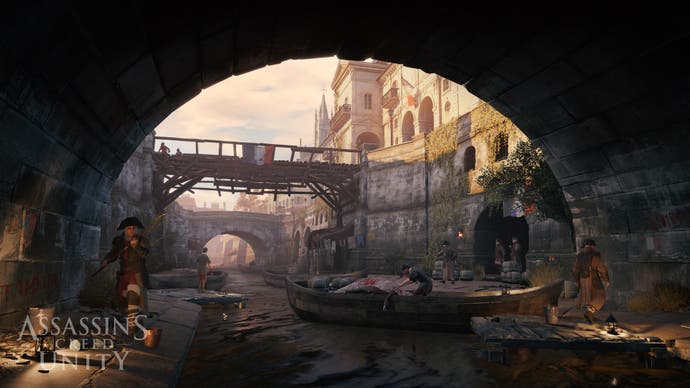
Talking of time travel: the present day Abstergo stuff reappears in Unity but will start "anew". "There's no 'previously on'." Amancio explains: "It's narratively linked - the context is linked. We're not erasing anything. But it is a new start; it is a new context and a new start. There is one familiar character but again, the context is so different that me giving you any information would have me explain what the context is. The only thing I can tell you is: Black Flag told you you're the protagonist because you're playing this Abstergo employee; we take it one step further. There's no layer of Abstergo employee; you, the player, are actually acknowledged as the protagonist of this game." And before you ask, it has nothing at all to do with Desmond, despite some the theories circulating.
Let's get back to Paris, which, is not only a large game area, but a freer one than in previous Assassin's Creed games. In those you followed a rigid storyline, beelining for side-quests along the way, but in Unity your progression from novice to master assassin is the storyline, which means the story is about how you play the game. (Incidentally, this is hung together by the story of main character Arno's redemption, as well as deeper layers of story about choosing between love and duty, and about extremism at that period in history. "We wanted to respect our fans who are older now, are more mature," says Amancio. "They're ready for a story like this.")
Missions are a block of content with an overarching goal, such as killing someone (in the mission I see). A brief cutscene plays at the start of the mission to give you an overview and highlight some possible avenues you could explore - those guys stole some keys, that door is interesting - and then it's over to you. Say things go wrong and you're supposed to be tailing someone but you lose them; in Unity that doesn't signal failure. You can find them again somewhere else in the city, or the mission could become a chase if they start running. Or, if you kill them, you may find a letter on their body giving you a clue as to where they were going, but if they don't get there... well, their friends will want to know why. There's malleability to missions now. And when you reach your target you won't get a blood-gargled monologue, but instead see their life flashing before their eyes, and the plot will move on that way.
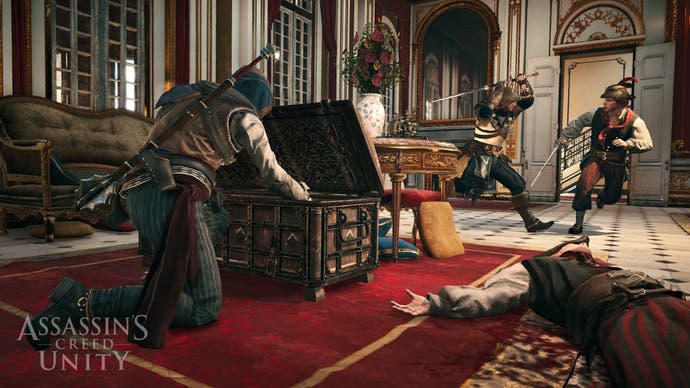
Wrapped up in those missions will be contextual side-quests such as murder mysteries, treasure hunts (with clues buried in the extensive database), and there will be "tons" of collectibles around Paris. But there are no board games, Amancio confirms, because Unity is all about aligning the content with that overarching sandbox mission.
More fundamentally in Unity, significant changes have been made to how it plays - to stealth, climbing and, yes, fighting. "Our rule is if you give someone the controller and, if in four seconds, that person can't tell that it's different - in the controller, not under the hood - then we need to rework it," Amancio reveals. "Our fighting has been redone because the path of least resistance is always the path that people will take." In other words, it was too easy to take on groups of enemies and win, so why be all stealthy about it? The deadly parries of previous Assassin's Creed games seem to have gone, judging by what I played, and killing enemies toe-to-toe takes time and can leave you exposed and overrun. Enemies also won't wait their turn to attack, and some may shoot while others swing.
You're still as deadly - if not deadlier - killing from stealth as you ever were, nonchalantly slipping blades into people in broad daylight as you saunter past. There are gruesome close-ups on key targets and there's a brutality to the killing, but that's always been Creed's calling card. What's new about Unity is that there's an actual stealth mode, triggered by holding the left trigger, and it sticks you to cover along the way. Enemies no longer have little triangles that fill up above their heads to signify if they've spotted you or not. They're a bit more intelligent, and they search for you in your last known location. A new HUD element - a line around your waist - tells you who has spotted you and where. And if you're overrun you can throw a smoke bomb to try and disappear.
There's been a seemingly small but significant change to climbing, which adds the ability to auto-climb up, by holding A, and auto-climb down, by holding B, which gives you added flexibility manoeuvring across levels. The animations are more fluid and acrobatic and exhilarating than ever.
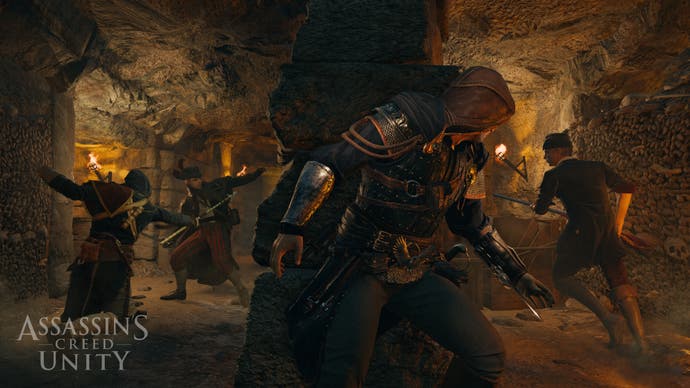
There's a new Phantom Blade weapon in Unity that you can upgrade, as you can with all the weapons and armour, and there's a dizzying amount on offer. There are 200-ish pieces of equipment across five body parts to collect, and something like 85 different weapons. You can buy these using in-game currency, and using real money, the developer demoing co-op reveals to me. But Ubisoft isn't ready to say any more.
You use your Arno from single-player in the game's biggest new addition, co-op. The co-op missions are copies of what you play in single-player, albeit in Brotherhood or Heist variations, which are sometimes for two people, sometimes for four. The Heists are newly revealed and involve a reward timer ticking down that controls the prize you'll receive for completing your objective. You can unlock specific co-op skills, which I don't see, but otherwise the two-player co-op demo holds no great surprises: this is Assassin's Creed with another player, novel though that is, and it works. There isn't going to be any player-versus-player fighting at all in the game.
Co-op was something fans asked for, Amancio insists, and something that fits the themes of the game. But more importantly it enabled Ubisoft Montreal to make the deeper changes for Unity that it has - something to do with replication and having multiple characters interact with an AI game world. In some ways co-op allowed Amancio and his huge team a chance to wipe the slate clean. "At the end of a cycle, you will have piled up a lot of that stuff [ancillary features] to create the game you're making," he tells me. "Black Flag is the best core experience, plus the best of naval, and an entire different game structure to reinforce those two things. We have an opportunity that none of the other games have, because we can redo everything. The stuff that we take for granted - the core pillars - we've redone all of that."
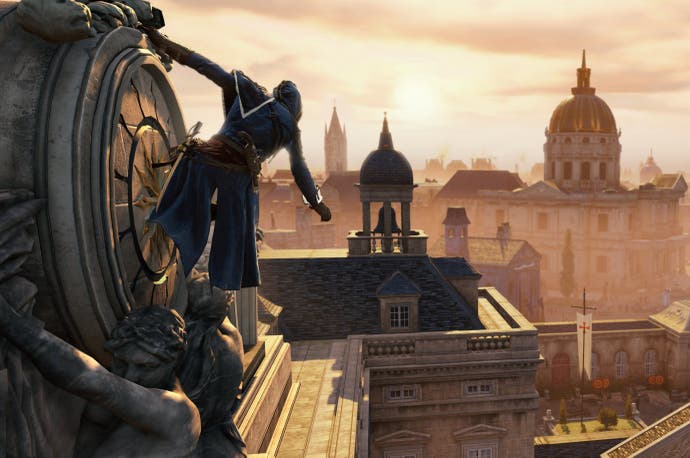


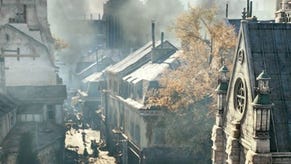


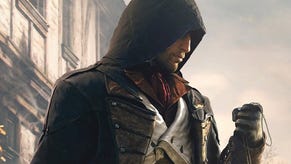
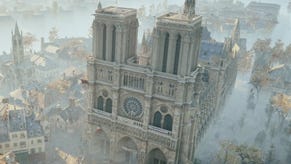
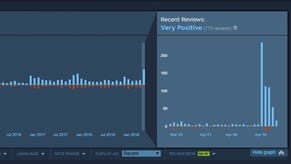




.png?width=291&height=164&fit=crop&quality=80&format=jpg&auto=webp)



